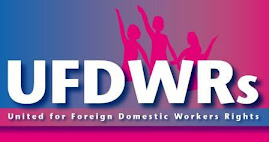Cambodia: New Regulation Short-Changes Domestic Workers
Revised Labor Migration Policy Weak on Recruitment Abuses
Human Rights Watch
For Immediate Release
(New York, August 30, 2011) – Cambodia’s revised regulation on labor migration, approved by Prime Minister Hun Sen on August 17, 2011, falls far short of minimum protections needed to safeguard migrant domestic workers, Human Rights Watch said today. The regulation omits or only has vague protections for workers and does not adequately address such problems as debt bondage, illegal recruitment of underage workers, and forced confinement by recruitment agencies in Cambodia, Human Rights Watch said.
The “Sub-Decree on the Management of the Sending of Cambodian Workers Abroad through Private Recruitment Agencies” was drafted without consulting civil society organizations or migrant workers.
“The Cambodian government didn’t even bother to talk with domestic or international organizations involved in these issues, let alone the workers themselves,” said Jyotsna Poudyal, children’s rights research fellow at Human Rights Watch. “The result is a regulation that doesn’t offer even minimum protections to Cambodians who face serious abuse when they agree to work abroad.”
Human Rights Watch urged the Cambodian government to revise the regulation or adopt a new policy on recruitment agencies that would address key concerns, such as recruitment fees and debts, freedom of movement in training centers, and child recruitment. Such protections should be created in consultation with domestic and international organizations working on migration and trafficking and include detailed methods for enforcement, Human Rights Watch said.
Cambodians travel abroad for work to escape unemployment at home and to send remittances back to their families. Most go to Thailand, South Korea, and Malaysia. The International Organization for Migration (IOM) estimates that the number of Cambodian migrants in Thailand alone was 248,000 in 2008. Many migrants, especially domestic workers en route to Malaysia, are subject to a range of deceptive and exploitative practices by poorly monitored recruitment agencies in Cambodia.
Recruitment agencies, and the local brokers they pay by commission, often fail to provide full information to prospective migrants about their training, recruitment debts, and employment abroad. Others help falsify documents to get around Malaysia’s requirement that migrant domestic workers must be at least 21 years old. Many of those who migrate are under age 18.
Women and girls typically must turn over the first six to seven months of salary to repay exorbitant recruitment fees to their labor agents in Cambodia. Once they agree to migrate, the recruitment agents require them to live in training centers in Cambodia for months until they leave for Malaysia. The recruiters require workers to pay the recruitment fees even if they change their minds about migrating and return home. Many workers who come from poor households have little choice but to accept overcrowded living conditions in the training centers and the employment contracts that labor agents require them to sign to work as domestic workers in Malaysia.
“The Cambodian government is well aware that recruitment agencies subject prospective workers, including children, to months-long confinement in overcrowded training centers, charge exorbitant recruitment fees, and harass them about repaying loans,” Poudyal said. “It is appalling that the new regulation fails even to mention these practices, which contribute to even graver abuses, including forced labor and trafficking.”
The new regulation replaces a 1995 measure, “Sub-decree No. 57 on the Sending of Cambodian Workers Abroad,” and includes some positive changes, Human Rights Watch said. It assigns the Ministry of Labor and Vocational Training the responsibility to inspect recruitment agencies. It requires the recruitment agencies to supply lawyers for migrants in legal proceedings abroad and contracts in the Khmer language between agencies and workers. It specifies “decent” living standards for the training centers though it does not specify the minimum requirements.
The new regulation includes penalties for violations by agencies. They begin with a written warning and can culminate in the revocation of an agency’s operating license. Agencies may also lose all or part of a US$100,000 surety deposited with the government upon registration. However, the regulation does not create accessible complaint mechanisms.
Human Rights Watch said the regulation failed to include many provisions outlined in the International Labor Organization’s (ILO) Convention on Decent Work for Domestic Workers, an international treaty adopted in June 2011. Article 15 on recruitment agencies stipulates accessible complaint mechanisms, substantial penalties for agencies that violate standards, and prohibitions on salary deductions for recruitment fees.
“The Cambodian government needs to get serious about protecting people who risk exploitation and abuse abroad to provide for their families,” Poudyal said. “To be effective, and to make a real difference in migrants’ safety, the government should set minimum standards, create rigorous monitoring, and enable prospective migrant workers to file complaints when mistreated.”
For more Human Rights Watch reporting on women’s rights, please visit:
http://www.hrw.org/category/topic/women
For more Human Rights Watch reporting on Cambodia, please visit:
http://www.hrw.org/asia/cambodia
For more information, please contact:
In New York, Jyotsna Poudyal (English): +1-212-377-9437; +1-917-576-6969 (mobile); poudyaj@hrw.org
In New York, Nisha Varia (English, Spanish): +1-212-216-1858; +1-917-617-1041 (mobile); or varian@hrw.org
In Bangkok, Phil Robertson (English, Thai): +66-85-060-8406 (mobile); or robertp@hrw.org



